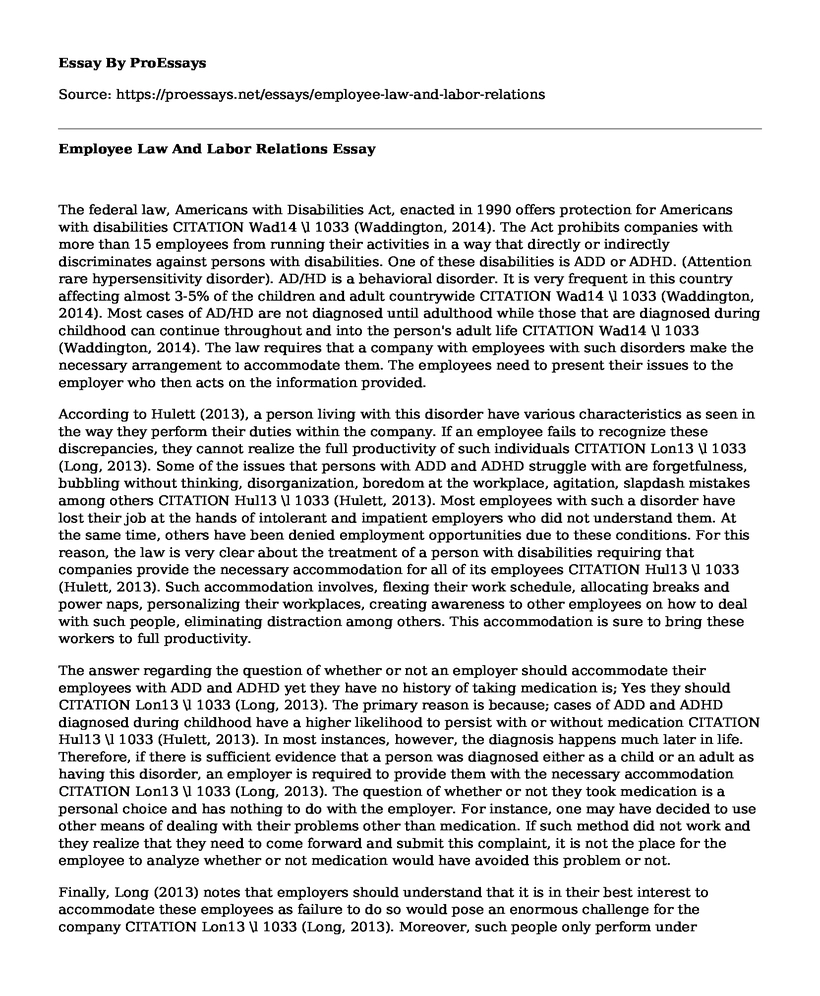The federal law, Americans with Disabilities Act, enacted in 1990 offers protection for Americans with disabilities CITATION Wad14 \l 1033 (Waddington, 2014). The Act prohibits companies with more than 15 employees from running their activities in a way that directly or indirectly discriminates against persons with disabilities. One of these disabilities is ADD or ADHD. (Attention rare hypersensitivity disorder). AD/HD is a behavioral disorder. It is very frequent in this country affecting almost 3-5% of the children and adult countrywide CITATION Wad14 \l 1033 (Waddington, 2014). Most cases of AD/HD are not diagnosed until adulthood while those that are diagnosed during childhood can continue throughout and into the person's adult life CITATION Wad14 \l 1033 (Waddington, 2014). The law requires that a company with employees with such disorders make the necessary arrangement to accommodate them. The employees need to present their issues to the employer who then acts on the information provided.
According to Hulett (2013), a person living with this disorder have various characteristics as seen in the way they perform their duties within the company. If an employee fails to recognize these discrepancies, they cannot realize the full productivity of such individuals CITATION Lon13 \l 1033 (Long, 2013). Some of the issues that persons with ADD and ADHD struggle with are forgetfulness, bubbling without thinking, disorganization, boredom at the workplace, agitation, slapdash mistakes among others CITATION Hul13 \l 1033 (Hulett, 2013). Most employees with such a disorder have lost their job at the hands of intolerant and impatient employers who did not understand them. At the same time, others have been denied employment opportunities due to these conditions. For this reason, the law is very clear about the treatment of a person with disabilities requiring that companies provide the necessary accommodation for all of its employees CITATION Hul13 \l 1033 (Hulett, 2013). Such accommodation involves, flexing their work schedule, allocating breaks and power naps, personalizing their workplaces, creating awareness to other employees on how to deal with such people, eliminating distraction among others. This accommodation is sure to bring these workers to full productivity.
The answer regarding the question of whether or not an employer should accommodate their employees with ADD and ADHD yet they have no history of taking medication is; Yes they should CITATION Lon13 \l 1033 (Long, 2013). The primary reason is because; cases of ADD and ADHD diagnosed during childhood have a higher likelihood to persist with or without medication CITATION Hul13 \l 1033 (Hulett, 2013). In most instances, however, the diagnosis happens much later in life. Therefore, if there is sufficient evidence that a person was diagnosed either as a child or an adult as having this disorder, an employer is required to provide them with the necessary accommodation CITATION Lon13 \l 1033 (Long, 2013). The question of whether or not they took medication is a personal choice and has nothing to do with the employer. For instance, one may have decided to use other means of dealing with their problems other than medication. If such method did not work and they realize that they need to come forward and submit this complaint, it is not the place for the employee to analyze whether or not medication would have avoided this problem or not.
Finally, Long (2013) notes that employers should understand that it is in their best interest to accommodate these employees as failure to do so would pose an enormous challenge for the company CITATION Lon13 \l 1033 (Long, 2013). Moreover, such people only perform under particular conditions, and thus, it could be more challenging if the employee in question is a crucial figure in the company. Making the necessary accommodation would cost the company less than they would incur by laying them off and hiring a replacement.
References
Hulett, A. L. (2013). An Examination of Attention Deficit Hyperactivity Disorder and
Counterproductive Workplace Behavior. Doctoral dissertation, University of Georgia.
Long, A. B. (2013). Reasonable Accommodation as Professional Responsibility, Reasonable
Accommodation as Professionalism. UCDL Rev., 47, 1753.
Waddington, L. (2014). Fine-tuning non-discrimination law Exceptions and justifications
allowing for different treatment on the ground of disability. International Journal of Discrimination and the Law.
Cite this page
Employee Law And Labor Relations. (2021, Mar 03). Retrieved from https://proessays.net/essays/employee-law-and-labor-relations
If you are the original author of this essay and no longer wish to have it published on the ProEssays website, please click below to request its removal:







